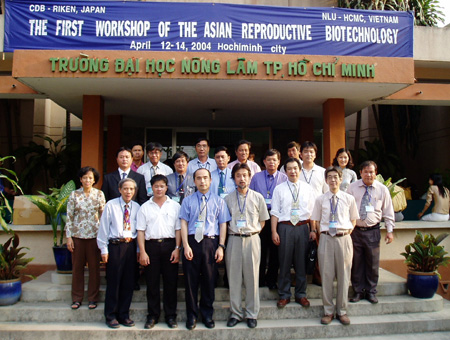| RIKEN Center for Developmental Biology
(CDB) 2-2-3 Minatojima minamimachi, Chuo-ku, Kobe 650-0047, Japan |
May 7, 2004 – The Asian Reproductive Biology Societ y (ARB) held its first workshop in Ho Chi Minh City in a meeting co-hosted by the RIKEN Center for Developmental Biology (CDB, Japan) and Nong Lam University (Vietnam). The inaugural meeting, which convened from April 12 to 14, was organized by Tuyen Bui Cach, rector of Nong Lam University and Teruhiko Wakayama, head of the CDB Laboratory for Genomic Reprogramming, and was attended by scientists from across Asia who presented and discussed their work in the development and application of reproductive biology technologies.
The meeting consisted of seven sessions over the course of three days, and featured talks on topics including the in vitro growth, maturation, fertilization and differentiation of mammalian oocytes and nuclear transfer technologies and applications. Research in these fields stands to revolutionize agricultural science and livestock breeding, and has implications to the development of fields ranging from organ transplantation and infertility therapies to the fundamental mechanisms of genetic reprogramming. Reproduction is a fundamental aspect of developmental biology, with fertilization representing the first step in the generation of an embryo and, ultimately, a new individual. Scientists in the Wakayama lab are engaged in unraveling the processes by which the unfertilized egg (oocyte), a highly specialized cell, is capable of being reset to an unspecialized, or "undifferentiated," state on fertilization, thereby gaining the developmental capacity to give rise to all of the many types of cells needed to make an individual. Cloning by nuclear transfer, a technically challenging procedure that involves the artificial triggering of the reprogramming of the oocyte by some yet-unknown means, provides a system for addressing the issue of how such de-differentiation is achieved. A number of talks at the meeting, including one by Wakayama, explored the state of the science and questions remaining in the field of genomic reprogramming induced by nuclear transfer. The second meeting of the ARB will be held at the School of Biotechnology, Suranaree University of Technology, Thailand, in October 2005. |
||||
[ Contact ] Douglas Sipp : sipp@cdb.riken.jp TEL : +81-78-306-3043 RIKEN CDB, Office for Science Communications and International Affairs |
| Copyright (C) CENTER FOR DEVELOPMENTAL BIOLOGY All rights reserved. |
